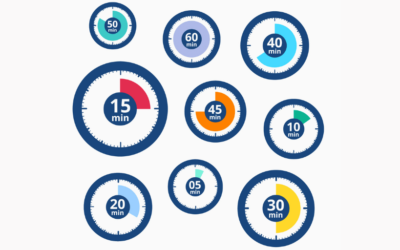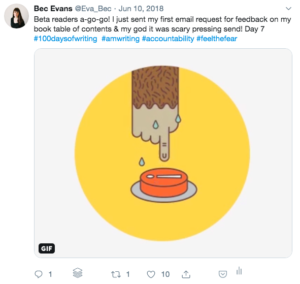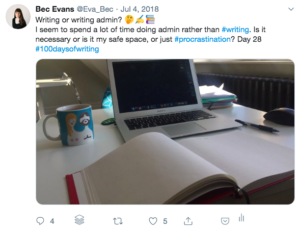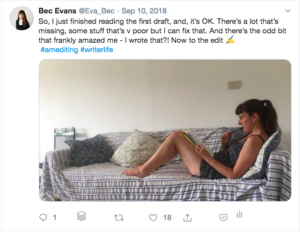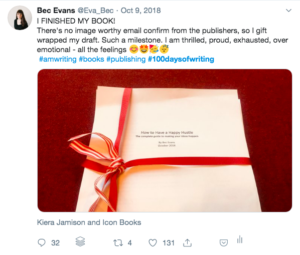Getting my book deal was the achievement of a life-long goal. Once the ink had dried on the publisher’s contract, reality set in. I actually had to write and deliver a book – 50,000 as yet unwritten words – in 100 days. There was no time to waste – I needed a plan.
So, I wrote a blog about it. I wasn’t procrastinating (honestly) but tapping into one of the most powerful accountability methods – going public.
The planning fallacy
In Best laid plans: how to beat the planning fallacy and meet deadlines I explored the concept of the planning fallacy, a term coined by psychologists Daniel Kahneman and Amos Tversky in the 1970s to explain the misplaced optimism we have when planning to meet a deadline. In short, people underestimate how long it takes to complete complex tasks – and in my experience, writers are the absolute masters of this.
Be in no doubt that I’m the head master of optimism. There I was, facing a hard deadline to write and submit a book, when I had never written a book before. I said:
“Luckily, I have a plan. I’ve got until 1 October to write, rewrite, edit, re-edit, and hand in the best possible version of my book. That’s around 100 days of writing allowing for the odd day off and one week’s holiday. Sounds manageable.”
Sounds manageable! Was I being foolishly optimistic or realistic?
>> Read more: How to make time to write – 4 approaches to finding time in busy schedules
Replacing optimism with data
Luckily for me, I had some sound advice to draw on. Over the last 40 years, researchers have been exploring misplaced optimism and found ways for Pollyannaish folk to root their bright-side thinking in some reality.
According to Prof. Yael Grushka-Cockayne from the University of Virginia’s Darden School of Business, there’s three steps to overcome the planning fallacy:
- Stop thinking about the project to come. Instead look back at past projects.
- Evaluate how those past projects did against their plans – did you meet the deadline, how, what happened?
- Revise your expectations! And, devise a plan for the new project based in experience and evidence.
Writing a book in 100 days
Back to my plan. I’m a big fan of novelist Jenn Ashworth and followed her progress on Instagram when she devised a #100daysofwriting challenge to overcome writer’s block. Using that approach, I planned to write my book in 100 days and went public with a 5-point plan to hold myself accountable. I said:
- Scheduling: I’ve blocked out two hours every day to write. It’s in my calendar alongside all my meetings and other commitments. It’s important and prioritised.
- Avoiding distractions: I’ve booked a desk at my local co-working space that I can use each day. That means I’m away from my own desk, work, family, and all the other distractions that eat away at my writing time (ahem, Twitter).
- Accountability: I’ve told my friends and family and got the support of my husband. We run a business together so he needs to buy into this book.
- Beta readers: Alongside the formal guidance I’ll get from my agent and publisher, I’ve set up a beta reader group. Over the last fortnight people have been signing up to help me and answering questions in an online survey.
- Tracking: I’ll track my writing on Prolifiko and share progress and pictures on Twitter using the hashtag #100daysofwriting.
>> Read more: #100DaysOfWriting – the gentle approach to writing productivity by Jenn Ashworth
Did I overcome the planning fallacy and meet my deadline?
Rather than look back on my first draft with rose-tinted spectacles SPOILER ALERT now my book is published, the benefit of tracking as you write means you can review the unedited as-it-happens experience.
Here’s my 100 days of writing, recorded on Twitter with photos and gifs. Let’s see how it went and whether my personal 5-point plan got me the results I planned.
1. Schedule time to write
The plan was to block out two hours each day to write. I work full time, but I had a level of flexibility that allowed me to start work later. I made writing my priority, did it first each day, and wrote every morning before work between 8-10am.
I learnt very quickly to not procrastinate and got straight down to it. But even with a daily writing habit – the so called gold standard of writing practice – it wasn’t enough time to make progress. I had to adapt my plans in two ways:
- I got up earlier and earlier to increase my writing time. My alarm finally settled at 5.15am and frankly it was hell – I do not recommend. But it worked and I’m still figuring this one out – is short-term pain worth it to reach long-term goals?
- I booked in extra deep dive days – mini writing-retreats where I had 2-3 whole days to get really stuck into things. I ran away to my Mum’s for these. She gave me time, space, cake and encouragement.
2. Avoid distraction
The intention was to remove me from the distractions that eat away at my writing time. I booked a desk at my local co-working space, Hebden Bridge Town Hall. At 8am each day I walked the 107 steps to the Town Hall where the business lounge became my distraction-free writing garret. It was a real win.
Most distractions are simply ‘life’ – work, family, chores – stuff I had to do, but could wait until after I had done my writing. If I was serious about writing, I had to prioritise it above these other things for a short while.
My social life shrank, my house got dusty, emails languished in my inbox for days. Nothing bad happened.
3. Build accountability structures
I reckon that telling people was the hardest part of the plan. It felt like I needed permission to write. I told my friends and family and asked for their support. I had to be honest with my husband as we work together, and negotiate what this might mean for our business.
Writers often talk themselves out of doing things because we fear what other people might say – but we don’t know unless we tell them. Our imagined fears can be the biggest block and barrier to our writing. When I told people, I received so much support and encouragement – my fears were unfounded.
4. Enlist the help of beta readers
When you have a traditional publishing deal like I did, you have systems in place to get feedback and advice. I was blessed with a brilliant agent and editor at the publishers.
Alongside that formal support, I set up a beta reader group – a mix of my target audience and experts who would read and feedback back as I wrote. They became a sounding board, my trusted advisers and cheerleaders, and some have become firm friends.
I kicked off the beta reader group with a survey asking why they wanted to make their ideas happen. This helped me empathise with the target readers for my book and understand their motivation and what they struggle with.
>> Read more: The complete guide to writing accountability – hold yourself to account and use others to help you achieve your writing goals
As I wrote, I kept them up to date with email updates. I ran everything past them: from the table of contents, the book title, cover design and the all-important reading of the first draft. My book is so much better for their feedback and am grateful they took the time to help and be honest with me.
5. Track and learn as you write
I tracked my writing on Prolifiko and shared progress on my Twitter using the hashtag #100daysofwriting.
I believe that tracking is a superpower. However, it only helps you to fly if you review data so you can learn from your experience, especially from what doesn’t go so well.
I learnt that I was procrastinating. Not with typical guilty pleasures like YouTube, snacking and tidying up, but by planning and organising. Admin was my happy place, my go-to procrastination activity and it took me weeks to realise that this important task was eating into my prime writing time. Once I noticed, I moved admin tasks to another time, usually the evenings or very early morning, so while I still did admin, it never ate into my golden writing hours.
>> Read more: A guide to tracking your writing – why noticing how you write will transform your practice
6. Bonus: embed habits with rewards
When I designed my 5-point accountability plan I focused on classic productivity interventions: how, when, where I wrote and what support I needed.
I missed out one area completely – the joy of writing, specifically the importance of celebration.
Researchers have found that rewards play a vital role in embedding long-term habits and behaviour change. Productivity often focusses on hair-shirt advice – get up early, stop drinking, stop seeing people, be ruthless with your time and attention. While these are all helpful the opportunity cost can diminish the pleasure in your life and make you question whether it is all worth it.
If you want to keep motivated to continue with your writing it helps if you enjoy it.
I noticed what went well and kept a diary of my daily good things, I rewarded myself after each session with a good cup of coffee, I celebrated milestones with friends, and I booked a holiday in advance as a reward for completing my first draft. It was an incentive to keep writing and a milestone I was determined to achieve.
And I did achieve it. I printed off my scrappy first draft to read on holiday.
How to write a book in 100 days
Whether you want to write a book in 100 days, 100 weeks or 100 months, you need a plan. Here’s how to get one.
- Decide your goal. Write or draw what you want to achieve. It’s important at this early stage to feel excited and motivated to do it – even if it’s a bit scary.
- Look back on your experience to gather evidence. Consider any previous writing projects or other times you’ve hit big goals. What blocks and barriers did you face? What helped you?
- Make a plan. It might involve revising your expectations – it’s likely you’ll be rather optimistic. Think who or what will hold you accountable.
- Take it in small steps. Be clear when you will write and what you will do, and how you’ll reward yourself as you hit milestones.
- Productivity is personal. Your plan will look very different to other people’s plans, so track and learn from your personal experience. Keep experimenting with different tactics until you find a system that works for you.
***



